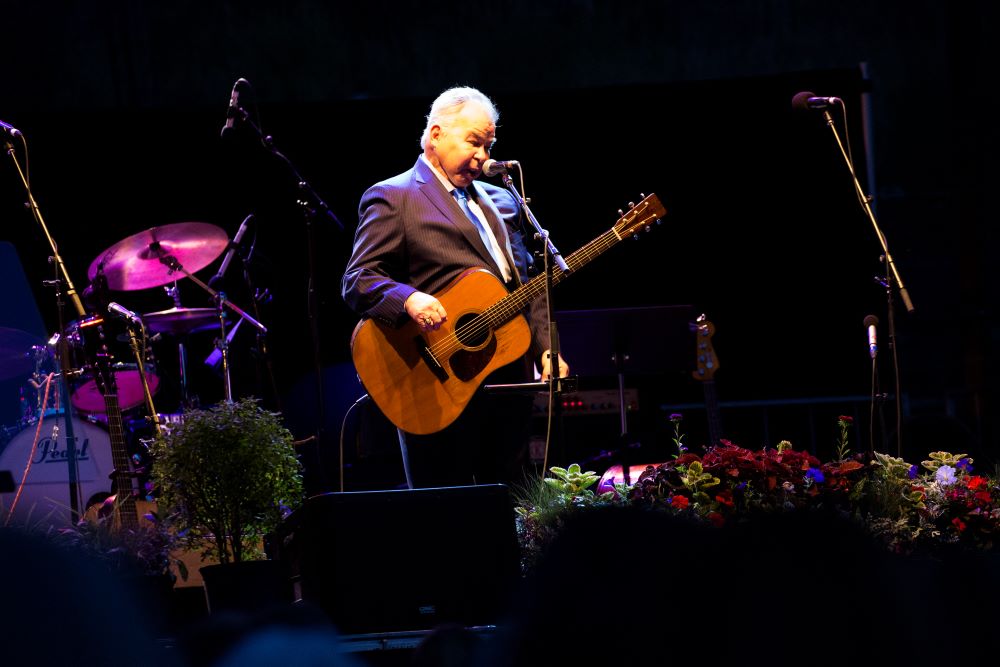
John Prine performs at Yellowstone National Park in Montana during an August 2016 concert celebrating the National Park Service's centennial. Prine, a two-time Grammy-winning country folk singer-songwriter, died April 7, 2020, of complications of COVID-19. He was 73. (Wikimedia Commons/ Yellowstone National Park/Matt Ludin)
I.
I met John Prine after he died. He was 73, and I, about the age he was when he started writing music.
I'd heard Bonnie Raitt's cover of "Angel from Montgomery." I'd heard Brandi Carlile croon her own plainspoken lyrics. I'd heard Tyler Childers' soft and heartbreaking lilt, singing about people he loved and places that no longer existed. In these ways I had heard John Prine; I had heard what he made possible.
But it was his death that brought me to his first album, "John Prine," released 50 years ago in 1971.
II.
Prine was a documentarian. His first album is a testament to that: offering surveys of how things were or continue to be. How things hurt. How lives ended. How love plodded on despite those many endings. His music relies on the idea that everyone likes to hear a story, and in "John Prine" we get 13 of them.
"Paradise" is a place that no longer exists. It's a memory or maybe a dream and definitely a story. "Sam Stone" is a man asked to sacrifice himself while we watch. "Hello in There" is a reproach to our forgetting the old. "Angel from Montgomery" is a woman looking for absolution. And a little company.
Advertisement
Like Prine's characters, we age and we search, and time is no guarantee of an answer's arrival. Prine understood that there's something violent about the passage of time, how a violence can grow larger if we don't look it in the eye. And at the end of the day, at the very end of your pain, what's left to do but tell the story of how you got there?
"Paradise,” one of Prine's best known tracks on the album, tells the story of a home nestled in the mountains of a coal mining town — Paradise — in Muhlenberg County, Kentucky. Paradise, Kentucky, no longer exists. Ravaged by the industry and by the illnesses given by that work, the town is a gravestone of its former self. The federal government razed the town in the late 1960s due to public health concerns, so by the time that Prine was singing about wanting to return, he no longer could. The lyrics acknowledge this: "I’m sorry my son, but you're too late in asking. Mr. Peabody's coal train has hauled it away." Even if you’ve haven’t been to Muhlenberg County (and most of us will never go), the story of a place exploited and disappeared, and later made into a memory, resonates and heals.
When we can no longer go, it's the story that keeps the place alive.
III.
John Prine was an accidental star, discovered in the kind of way that seems nearly foreign to these times. In his early to mid-20s living in Chicago, Prine wrote songs in his spare time, often while delivering mail during his brief stint as a U.S. Postal Service employee. Prine sometimes performed his songs at open mics, roping the audience into his way of seeing the world.
By the time Prine came around, the American Folk Music revival of the 1950s and '60s had already bloomed and settled: Bob Dylan had released nine albums in ten years, while the Beatles and The Rolling Stones exploded British rock into the U.S. in the mid-1960s. The Vietnam War, which had driven much of folk music's broad sociopolitical appeal, was in its final four years.
But there were still stories to be told in quiet rebellion, stories that needed to become alive.
IV.
I'm increasingly convinced that the only thing that changes with the years are the numbers themselves. The problems of yesterday are present today, the political divisions of four or five decades ago mirror what we read on the news now. Many have written about the passage of time, how history is more real, in fact more alive, than the present. We are an amalgam of our pasts. "My old man is another child that's grown old," Prine sings in "Angel from Montgomery." There’s no such thing as telling stories of the present. We are as we have always been.
What becomes of the present, then, when your life is overrun by violences of the past? Coal mining, impoverishment, war, racism, loss of ancestral knowledge: the violences compound each other, and continue each other. And as a young person, having discovered "John Prine" a year after the artist's death in April 2020 and still embedded in a pandemic, I wonder how to make violence bearable in the present. Because we do have to bear it. With our consent or not, the things that happen to us change us, and if we don't fight their consequences, they become us. At the same time, if we don’t accept our realities, we grow to resent them, and then surely, we grow to resent ourselves.
Prine knew that these stories and questions served a function: to make sure violences don't become us, and the story's end helps us put the violence down for a moment. In the silences between stories, or say, the years before a pandemic and the years after, we'll be asked how we're doing. And without getting too deep into the stories of our lives, it's easier to say, as Prine sings, "Pretty good, not bad, I can’t complain."




